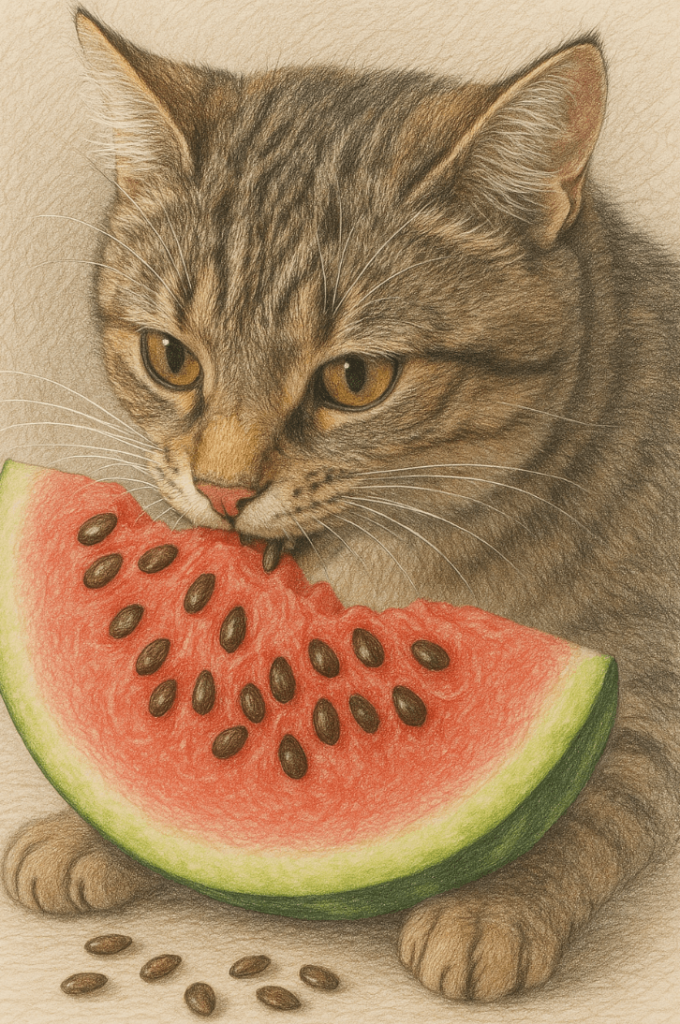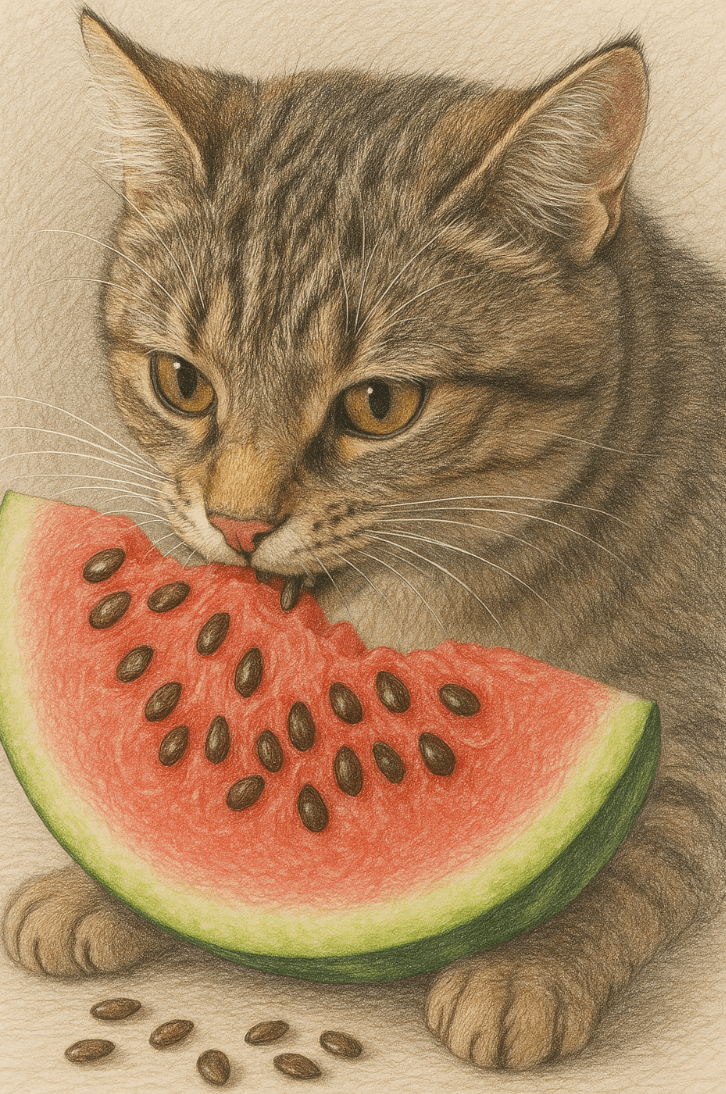Can Cats Eat Watermelon Seeds?
Watermelon is a refreshing and hydrating treat that many of us enjoy during the summer months. But what about our feline friends? If you’ve ever wondered whether cats can safely eat watermelon seeds—or even watermelon itself—you’re not alone. While cats are obligate carnivores, meaning their diet primarily consists of meat, they may occasionally show interest in fruits like watermelon. However, certain parts of the fruit, such as the seeds, could pose risks if ingested. In this blog post, we’ll explore whether watermelon seeds are safe for cats, discuss potential dangers, and provide tips for offering your cat a safe and enjoyable snack.
Potential Risks of Watermelon Seeds for Cats
While watermelon itself is generally safe for cats in moderation, the seeds can present some concerns. Understanding these risks will help you make informed decisions about feeding your cat this summertime favorite.
Choking Hazard:
Watermelon seeds are small and hard, making them a potential choking hazard if swallowed whole.Digestive Blockages:
If ingested in large quantities, seeds can accumulate in the digestive tract, leading to blockages that may require veterinary intervention.Chemical Concerns:
Some watermelon seeds contain trace amounts of compounds that could be harmful if consumed in excess.Difficulty Passing Seeds:
Cats lack the ability to break down seeds effectively, which may result in discomfort or gastrointestinal upset.Risk of Pesticides:
Non-organic watermelons may have pesticide residues on the seeds, posing additional health risks for your cat.
These risks highlight why it’s important to remove seeds before offering watermelon to your cat.
Benefits of Feeding Watermelon (Seedless) to Cats
When prepared safely, watermelon can offer some benefits to cats, especially as an occasional treat. Here’s why your feline friend might enjoy a small piece of seedless watermelon.
Hydration Boost:
Watermelon is approximately 92% water, making it an excellent way to keep your cat hydrated, especially during hot weather.Low Calorie Snack:
Seedless watermelon is low in calories, making it a guilt-free treat for cats who need to watch their weight.Vitamins and Antioxidants:
Watermelon contains vitamins A, C, and B6, which support immune health and overall well-being.Natural Sweetness Appeal:
The mild sweetness of watermelon can satisfy your cat’s occasional cravings without added sugars or artificial ingredients.Mental Stimulation:
Offering a new and unusual snack like watermelon can provide mental enrichment and variety in your cat’s diet.
By removing seeds and rind, you can safely share this refreshing fruit with your cat in moderation.
Check this guide 👉Can Cats Eat Avocado Oil? Best 7 Expert Tips!
Check this guide 👉Can Cats Eat Grapefruit? Best 7 Expert Tips!
Check this guide 👉Can Cats Eat Turmeric? Best 7 Expert Tips!

Safe Practices for Feeding Watermelon to Cats | Things to Avoid When Feeding Watermelon |
|---|---|
Remove all seeds before serving | Feeding large chunks or whole slices |
Offer only ripe, fresh watermelon | Giving watermelon with pesticides or chemicals |
Cut into small, bite-sized pieces | Allowing access to the tough outer rind |
Limit portion sizes to prevent overeating | Feeding flavored or sugary watermelon products |
Monitor for any adverse reactions | Offering watermelon daily or in excess |
How to Safely Prepare Watermelon for Your Cat
If you decide to share watermelon with your cat, preparation is key to ensuring their safety and enjoyment. Follow these steps to minimize risks and maximize benefits.
Choose Organic Watermelon:
Opt for organic varieties to avoid pesticide residues that could harm your cat.Remove Seeds Completely:
Carefully pick out all seeds, as even a few can pose a choking or digestive risk.Peel the Rind Thoroughly:
The tough green rind is difficult for cats to digest and should always be discarded.Cut Into Small Pieces:
Slice the watermelon into tiny, manageable portions to prevent choking hazards.Introduce Gradually:
Start with a small piece to see how your cat reacts before offering more.
Proper preparation ensures a safe and enjoyable experience for your curious feline.
Signs Your Cat May Not Tolerate Watermelon
While most cats can handle a small amount of seedless watermelon, some may experience adverse reactions. Watch for these signs to determine if watermelon isn’t suitable for your pet.
Vomiting or Diarrhea:
These symptoms indicate that your cat’s digestive system is struggling to process the fruit.Lethargy or Discomfort:
A lack of energy or visible discomfort may signal an allergic reaction or intolerance.Excessive Drooling:
Drooling can occur if your cat finds the texture unpleasant or has difficulty swallowing.Loss of Appetite:
Refusal to eat regular meals after trying watermelon suggests it didn’t agree with them.Swelling or Itching:
Facial swelling or itching around the mouth could indicate an allergic response.
If you notice any of these signs, contact your veterinarian immediately for guidance.
Common Mistakes to Avoid When Feeding Watermelon to Cats
Even well-meaning cat owners can make mistakes when offering watermelon. Avoiding these errors ensures a safer experience for your pet.
Leaving Seeds in the Fruit:
Even a single seed can pose a choking hazard or lead to digestive issues.Offering Large Portions:
Too much watermelon can upset your cat’s stomach due to its high water and fiber content.Ignoring Allergies or Intolerances:
Not all cats react well to fruits; failing to observe their response can lead to problems.Using Flavored or Processed Varieties:
Artificially sweetened or flavored watermelon products are unsafe for cats.Forgetting to Check for Pesticides:
Non-organic watermelons may carry harmful chemical residues that affect your cat’s health.
Avoiding these mistakes keeps your cat safe while letting them enjoy a tasty snack.
Alternative Hydrating Treats for Cats
If watermelon isn’t suitable for your cat, there are plenty of other hydrating treats you can offer instead.
Cucumber Slices:
Cucumbers are hydrating and easy for cats to digest when cut into small pieces.Seedless Blueberries:
These tiny fruits are packed with antioxidants and make a great occasional treat.Plain Yogurt Drops:
A small dollop of plain yogurt can provide hydration and probiotics for gut health.Ice Cubes Made from Broth:
Freeze low-sodium chicken broth into cubes for a flavorful and hydrating snack.Fresh Cantaloupe:
Seedless cantaloupe is another hydrating option that many cats enjoy in moderation.
These alternatives cater to your cat’s hydration needs while offering variety.
Understanding Your Cat’s Dietary Preferences
Cats have unique tastes and dietary requirements, so understanding their preferences helps you make better choices about treats like watermelon.
Obligate Carnivore Diet Needs:
Cats thrive on a meat-based diet, so fruits should remain an occasional indulgence rather than a staple.Individual Taste Preferences:
Some cats love the sweetness of watermelon, while others may show no interest at all.Sensitivity to New Foods:
Cats often have sensitive digestive systems, so introducing new foods slowly is crucial.Curiosity vs. Hunger:
Cats may investigate watermelon out of curiosity rather than hunger, so don’t mistake this for a craving.Monitoring Reactions:
Paying attention to how your cat responds helps you determine what works best for their individual needs.
By respecting your cat’s preferences and limitations, you can enhance their diet safely and thoughtfully.
Frequently Asked Questions About Cats and Watermelon
Can cats eat watermelon rind?
No, the rind is too tough for cats to digest and should always be removed.
Are watermelon seeds toxic to cats?
While not highly toxic, seeds can cause choking or digestive blockages, so they should be avoided.
How much watermelon can I give my cat?
Stick to a teaspoon-sized portion once or twice a week to avoid upsetting their stomach.
What other fruits can cats eat?
Safe options include seedless apples, blueberries, and cantaloupe in moderation.
Should I consult my vet before feeding watermelon?
Yes, especially if your cat has underlying health conditions or dietary restrictions.
Prioritizing Your Cat’s Safety When Sharing Watermelon
Feeding your cat watermelon can be a fun and hydrating treat, but it’s essential to prioritize their safety by removing seeds and preparing the fruit properly. While most cats tolerate small amounts of seedless watermelon well, individual preferences and tolerances vary. Always monitor your cat for any adverse reactions and consult your veterinarian if you’re unsure about introducing new foods. By taking these precautions, you can share a little slice of summer with your feline friend while keeping them healthy and happy.
Do Cats Have Taste Buds? Best 7 Expert Tips! – Discover how cats experience flavors and why their taste is so unique.
Do Dogs Have Taste Buds? Best 7 Expert Tips! – Discover how dogs experience taste, their preferences, and what it means for their diet and health.
Can Cats Taste Sweet? Best 7 Expert Tips! – Discover why cats can’t taste sweetness, how it affects their diet, and tips to keep them healthy and happy.
Can Dogs Taste Sweet? Best 7 Expert Tips! – Discover how dogs perceive sweetness, which foods are safe, and tips to manage their sweet cravings responsibly.





